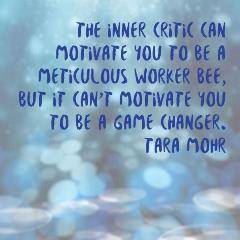Recently we had Tara Mohr, author of Playing Big, on our Mom Corps YOU podcast to talk about ways we can begin playing big ourselves. But now what can we do to help others play big? How can we support our staff and help them to be the best they can be, and in turn, help to propel our organizations to greater heights?
You might ask, what does playing big really mean? No, it’s not about titles, money or fame (although these may come with it). Playing big is moving beyond self-doubt and achieving our greatest individual potential. Something we define for ourselves…and not determined by others.
How then can we help others to play big? There are many great points in Playing Big; three of them we can use to help our employees.

Inner Critic In the book, Tara talks about this “inner critic” that lives inside of us. That voice of “not me” that speaks not the truth or reality, but words to help us avoid emotional risk. We cannot eliminate this voice, but what we can do is acknowledge it and move on based on what we know is true.
As management how can we help others acknowledge and move beyond their inner critic?
Create a supportive culture. Encourage conversations about our “inner critics.” We have heard time and time again about the value of sharing and hearing from our peers, and those we admire or who are in positions above us. For us to learn that they too have dealt with similar struggles, faced the same fears, or overcome comparable obstacles. And sometimes, simply the need to hear what others see in us that we may not.
As part of the Resilience Consortium, Harvard compiled a collection of “Reflections on Rejections” where Harvard staff, students and alumni share their rejection letters. Why not do something similar in talking about our inner critic? Ask ourselves, what can we do to help others achieve their goals? What barriers can we remove for them? Ask them, what do they believe is holding them back from achieving their greatest potential? What do they see preventing them from achieving their dreams and/or goals?
Unhooking It’s the act of disconnecting from, in this case, criticism and praise. Recognizing that neither tell us about us, but of the person providing the feedback. For ourselves, we need to listen to it and incorporate it when useful, but not be dependent upon or hindered by it. Feedback simply tells us what is resonating with our audience.
How can we help others to unhook? Often one’s decisions are made based on what they anticipate other’s reactions to be. We ask for creativity, new ideas, “outside of the box” thinking. But if an employee fears you or their co-workers response, they may choose to play it safe (or small) and hold back to protect themselves from that “emotional risk.” What if we created at atmosphere similar to the TD Lab, TD Bank’s partnership with Communitech to foster innovative thinking about banking? A place where anyone can suggest or contribute an idea, and be fearless.
Self-Promotion It’s often seen as a dirty word to women. Something they don’t want to engage in. Yet sharing one’s accomplishments is more often than not, a necessity in business. So let’s go ahead and erase that stigma. Create a culture in our companies that celebrates efforts, achievements, and successes. Tara used a comparison in her book when a woman told her self-promoting was a masculine trait. She painted the picture of a 5 year old girl who had just done something she was excited about, and reminded them of what that little girl would likely do. She wouldn’t keep it to herself or downplay it. She would likely share it with pride. She then went on to suggest replacing the idea of “self-promotion” with “visibility with a focus on providing a service”; making it about sharing to help others.
What if we invited sharing of the great things each person is working on (inside and out of the workplace)? How many of the overlooked skills, accomplishments, or connections could help them and our organizations achieve more? For those with remote working positions, or in various satellite offices, it’s sometimes that much harder for this kind of news to travel.

Here at Corps Team, our CEO, Allison O’Kelly has made a concerted effort to spotlight a different individual each week (or as they are shared with her) in her “Why We Do What We Do” email. In this company-wide email she tells a short story of how one of the Corps Team members made a difference in someone’s life. This email is a great reminder of our “why” – and, helps make one’s accomplishments “visible” to others in our organization while bringing a sense of excitement to sharing.
We achieve more as an organization when we build one another up versus knocking each other down. What do you or your organization do to help employees play big? Take a moment to share in the comments, with pure kiddie-excitement, how you help you
